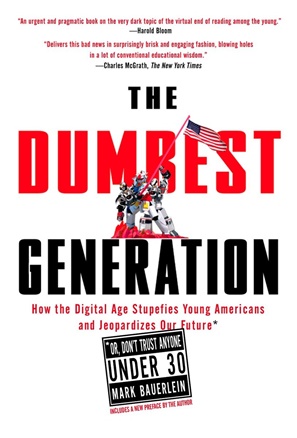Description
This shocking, surprisingly entertaining romp into the intellectual nether regions of today's underthirty set reveals the disturbing and, ultimately, incontrovertible truth: cyberculture is turning us into a society of know-nothings.
The Dumbest Generation is a dire report on the intellectual life of young adults and a timely warning of its impact on American democracy and culture.
For decades, concern has been brewing about the dumbed-down popular culture available to young people and the impact it has on their futures. But at the dawn of the digital age, many thought they saw an answer: the internet, email, blogs, and interactive and hyper-realistic video games promised to yield a generation of sharper, more aware, and intellectually sophisticated children. The terms “information superhighway” and “knowledge economy” entered the lexicon, and we assumed that teens would use their knowledge and understanding of technology to set themselves apart as the vanguards of this new digital era.
That was the promise. But the enlightenment didn’t happen. The technology that was supposed to make young adults more aware, diversify their tastes, and improve their verbal skills has had the opposite effect. According to recent reports from the National Endowment for the Arts, most young people in the United States do not read literature, visit museums, or vote. They cannot explain basic scientific methods, recount basic American history, name their local political representatives, or locate Iraq or Israel on a map. The Dumbest Generation: How the Digital Age Stupefies Young Americans and Jeopardizes Our Future is a startling examination of the intellectual life of young adults and a timely warning of its impact on American culture and democracy.
Over the last few decades, how we view adolescence itself has changed, growing from a pitstop on the road to adulthood to its own space in society, wholly separate from adult life. This change in adolescent culture has gone hand in hand with an insidious infantilization of our culture at large; as adolescents continue to disengage from the adult world, they have built their own, acquiring more spending money, steering classrooms and culture towards their own needs and interests, and now using the technology once promoted as the greatest hope for their futures to indulge in diversions, from MySpace to multiplayer video games, 24/7.
Can a nation continue to enjoy political and economic predominance if its citizens refuse to grow up? Drawing upon exhaustive research, personal anecdotes, and historical and social analysis, The Dumbest Generation presents a portrait of the young American mind at this critical juncture, and lays out a compelling vision of how we might address its deficiencies. The Dumbest Generation pulls no punches as it reveals the true cost of the digital age—and our last chance to fix it.
About the Author
Mark Bauerlein earned his doctorate in English at UCLA in 1988. He has taught at Emory since 1989, with a two-and-a-half year break in 2003-05 to serve as the Director, Office of Research and Analysis, at the National Endowment for the Arts. Apart from his scholarly work, he publishes in popular periodicals such as The Wall Street Journal, The Weekly Standard, The Washington Post, TLS, and Chronicle of Higher Education. His latest book, The Dumbest Generation: How the Digital Age Stupefies Young Americans and Jeopardizes Our Future; Or, Don’t Trust Anyone Under 30 (www.dumbestgeneration.com), was published in May 2008.
